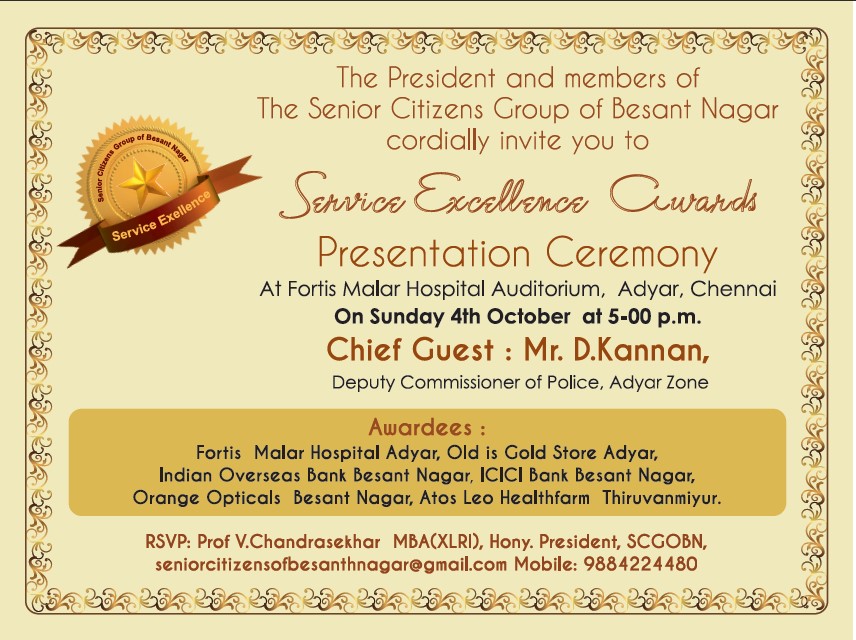The Senior Citizen Group recently convened a meeting to create awareness on encroachment and other issues faced by senior citizens.
You can read more about it here.
(http://www.epaper.cinemaexpress.com/c/8648005 ) Currently this page not available
The Senior Citizen Group recently convened a meeting to create awareness on encroachment and other issues faced by senior citizens.
You can read more about it here.
(http://www.epaper.cinemaexpress.com/c/8648005 ) Currently this page not available
It is indeed surprising, that despite being a culture that supposedly reveres the elderly, we don’t give the needs of the aged and the disabled in India any thought at all.
To truly appreciate how insensitive we are to the needs of the elderly (and the disabled), do this mental exercise. Imagine yourself to be wheelchair bound. Actually, let us not go that far yet. Just imagine you are an old person with slightly diminished reflexes and minor balance issues that necessitate you to carry a walking stick for balance. With that firmly in mind, now take a look at the world around you.
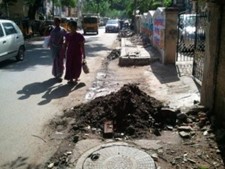 One of the few roads in Chennai with a footpath. Notice how there is construction debris all over the pavement and the two ladies are being forced to walk on the road, risking the prospect of being run over.
One of the few roads in Chennai with a footpath. Notice how there is construction debris all over the pavement and the two ladies are being forced to walk on the road, risking the prospect of being run over.
We have all experienced the serious challenges involved in walking on Indian roads. Now imagine you are that old person. Now think of walking on roads which lack pavements and have heavy and unregulated traffic driven by reckless and insensitive drivers. While you are looking both ways and dodging traffic, don’t forget to bend down and avoid all the wires and cables, thoughtlessly strung from poles, trees and buildings. Finally, remember to jump over the pits and trenches left open by various civic bodies. All this when you are weak and feeble!
The dangers of walking around on Indian streets today prevent countless elders and disabled from leaving the relative safety of their homes. Many of them forego their usual walks, their trips to places of worship, or even to banks and post offices to collect their pensions because of their fear of being run over or getting seriously injured.
Now take a look at the public transport available in your city.
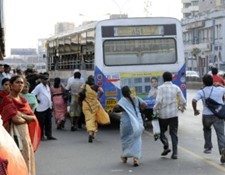 The picture on the right shows the true story. Look at how everyone is running to get into the bus. Notice the slower ones struggling to reach the bus. Imagine now that you are an old person incapable of running!
The picture on the right shows the true story. Look at how everyone is running to get into the bus. Notice the slower ones struggling to reach the bus. Imagine now that you are an old person incapable of running!
Buses come swerving in at breakneck speed and stop somewhere in the vicinity of the bus stop, wait but for a few seconds and speed away before everyone has safely boarded. With steep steps that only the young can jump onto, riding buses in India is meant only for the young and agile.
Trains are no better. Suburban trains, especially, are a challenge even for the young and nimble unless they are used to them. If you go to Mumbai for example, unless you are a regular traveller, there is very little chance of making it on to any of the suburban trains during peak hours. And if you do manage to get on, you may not be able to get off till the train reaches its last station! Long distance trains, though not as crowded, present us with other challenges. Their steps are practically upright ladders that have to be negotiated to get into them. If one is wheelchair bound, it is impossible to get on to the train at all, leave alone reach one’s seat, given how narrow the doors and passages are.
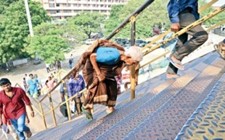 This picture with the bent over old lady is a picture of the foot over bridge at the Chennai Central Railway station. The picture says it all.
This picture with the bent over old lady is a picture of the foot over bridge at the Chennai Central Railway station. The picture says it all.
Next let us look at the insides public places and buildings. Many banks, post offices and insurance buildings are in old buildings with no elevators. Most of their offices are on the first or second floor with only stair access. Even those that are on the ground floor require navigation of a few steps before the counters can be reached. Barring a few malls and upmarket cinemas, most places have either no toilet facilities (for the visiting patrons) or have extremely dirty ones that no one in their right mind will want to step into. The lack of a token system and the consequent need of having to stand in a long queues for several minutes to hours compound the problems faced by the elderly in public offices and buildings.
These are just some of the problems faced by our elders in India. If you spot more such problems please write to [email protected].
The management of Old is Gold Store; Prithvi, Jaya and Sanjay felt the need to address the long neglected topic of understanding and managing incontinence (bladder weakness) among the senior citizens of our community. This led to the idea of organizing a workshop on incontinence for the benefit of elders and medical professionals. In January 2016, they organized a free workshop for senior citizens called “Bladder weakness (incontinence) – coping with ageing issues”.
“I believe a lot of elders are embarrassed to talk about incontinence, leave alone actively try and find a solution. By avoiding and neglecting this issue, the caregivers’ burden grows and their loved one suffers,” Prithvi said.
“We want to help elders understand and cope with incontinence with some of our products designed to provide comfort and relief,” Sanjay said.
This workshop addressed incontinence issues and solutions and was sponsored by M/s. Bella Premier Happy Hygienecare Pvt. Ltd, the makers of Seni Brand of Adult Diapers. The workshop was held on Thursday, Jan. 07 from 2:30 p.m. to 6:30 p.m. at Natesan Institute of Co-operative Management (NICM), Anna Nagar.
The key speakers were Dr. Kalaivani Ramalingam MBBS,DGO, MRCOG, CCT(UK), Consultant Urogynaecologist, Chennai Urology Clinic, Apollo Hospitals who spoke about “Incontinence – understanding the change” and Mr. Jerzy Jusiega (Seni, Poland) who spoke about “Incontinence – management: the easy hygienic way”.
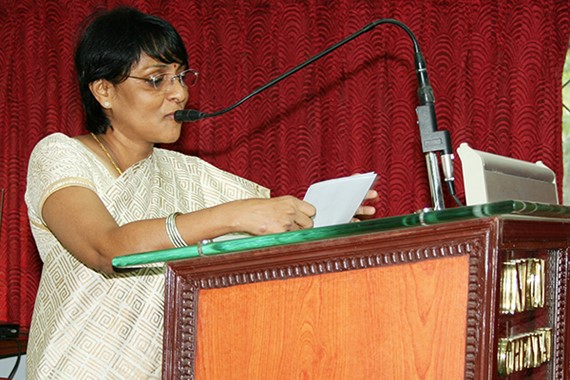
Ms.Jayashree – Director, Old is Gold Store, welcoming the guests.
Ms.Jayashree, Director, Old is Gold Store welcomed the packed audience and introduced both the speakers. She also outlined the vision behind Old is Gold Store and the need to address issues involved with Geriatric Care.
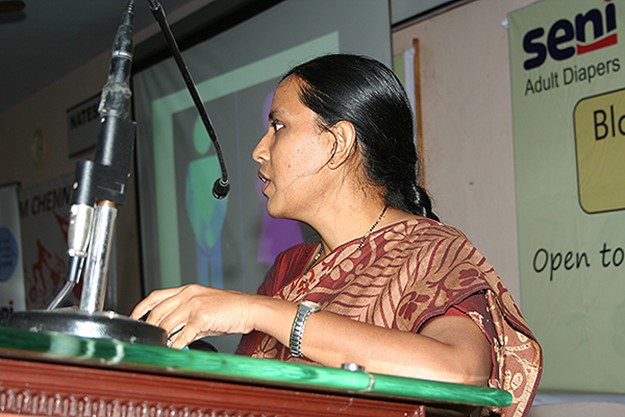
Dr. Kalaivani Ramalingam, spoke about “Incontinence – understanding the change”
Dr.Kalaivani’s presentation highlighted the problems faced by elders, both male and female. The presentation with accompanying slides was explained in layman’s terms in both English and Tamil for the benefit of the audience. The presentation lasted about 30 minutes and was followed by a Q&A session. Dr. Kalaivani Ramalingam answered all the questions put to her by the audience with patience and clarity. This was well received by the audience who were happy to have their questions clarified.
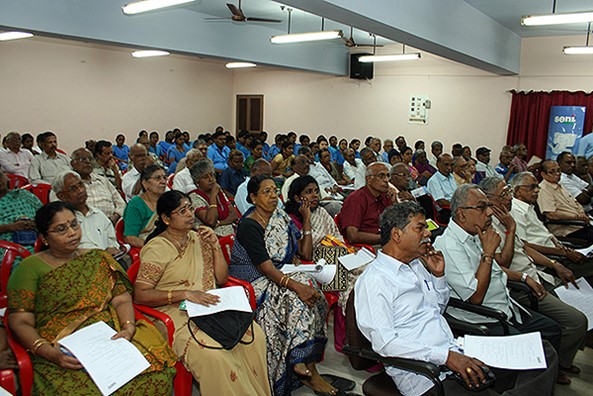
Participants at the workshop
View Dr.Kalaivani’s presentation on YouTube
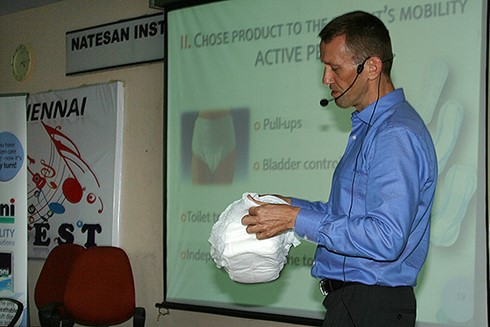
Mr. Jerzy Jusiega SENI, Poland demonstrates the use of incontinence support products.
The next presentation was by Mr. Jerzy Jusiega (SENI Adult Diapers, Poland) who spoke about “Incontinence – management: the easy hygienic way”. Mr. Jerzy Jusiega highlighted various incontinence products developed by SENI, Poland. He stressed the need to choose the right diaper and demonstrated how to take measurements. He also gave information on the latest technology used by SENI to manufacture the best incontinence support products.
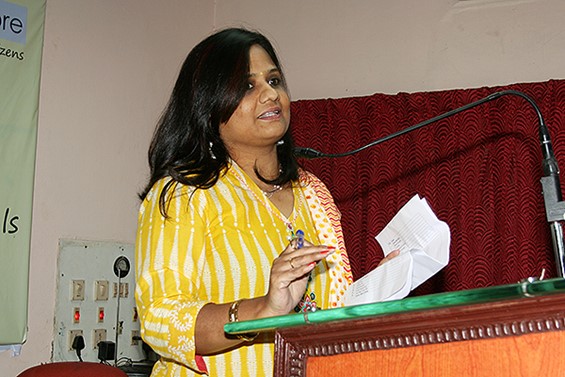
Andha Naal’ a retro quiz conducted by Dr Anitha Paramasivam
There was a 15 minute snack and coffee break followed by the much awaited ‘Andha Naal’ a retro quiz conducted by Dr Anitha Paramasivam. This quiz was open to senior citizens and medical professionals. Dr. Anitha was a charming and a witty hostess and was easily able to carry the audience with her. The participants enjoyed themselves and answered eagerly to all the questions. Those who gave the correct answers were rewarded with a discount voucher from Old is Gold Store.
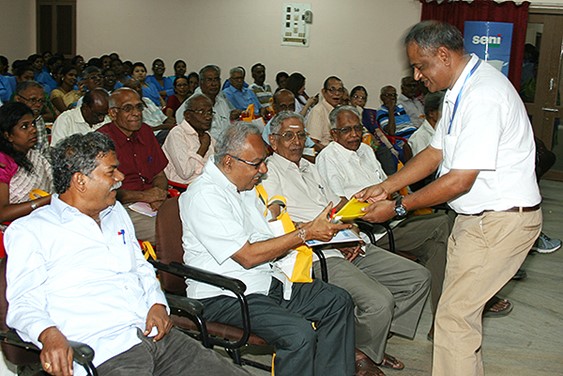
Mr.Prithviraj – Director, Old is Gold store giving a discount voucher during the retro quiz show
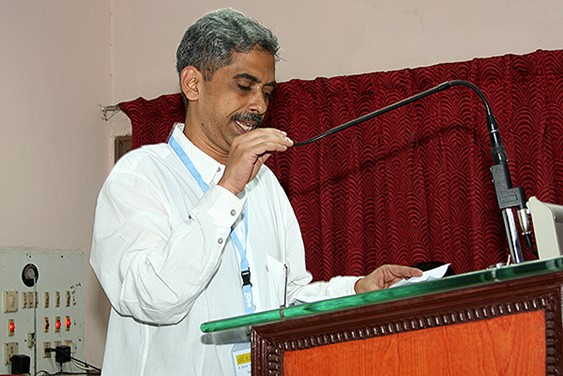
Mr. Sanjay Dattatri, Director – Old is Gold Store, giving the vote of thanks.
The workshop ended with a vote of thanks by Mr. Sanjay Dattatri, Director – Old is Gold Store.
A news report in Hindu talks about a new self-help group that is bringing together people with Parkinson’s. Here is an extract from the report:
 At first, Kannan S. thought there was something wrong with his eyes. He would feel exhausted when out in the sunlight, and found that his handwriting had begun to taper. Later, the resident of Nolambur was diagnosed with Parkinson’s disease, a progressive disorder of the nervous system that affects movement.
At first, Kannan S. thought there was something wrong with his eyes. He would feel exhausted when out in the sunlight, and found that his handwriting had begun to taper. Later, the resident of Nolambur was diagnosed with Parkinson’s disease, a progressive disorder of the nervous system that affects movement.
“I was put on medication, but I experienced a lot of side effects. And I was depressed. My confidence levels fell,” said the 68-year-old.
What changed this was Parivarthan for Parkinson’s, an Anna Nagar-based community support group for people with Parkinson’s disease and their families. Started about a year ago by Sudha Meiyappan, the group now has about 45 families involved and organises various activities including guest lectures every month, yoga sessions every week and home visits for those who cannot make it to the meetings.
To read the entire article, go here.
(https://www.thehindu.com/news/cities/chennai/combating-parkinsons-together/article7868738.ece )
A lot of people are still not aware of Parkinson’s Disease. Especially here in India, many people just think that the old man (or woman) is simply being obtuse and troublesome on purpose. In this film, however, a doctor describes the condition in a lucid manner and hopefully this will help more people recognize this condition and approach a doctor for treatment.
 A recent study shows that people become more trusting as they age. While there are a lot of positives associated with this increased trust, this can also lead to an increase in gullibility among the elders.
A recent study shows that people become more trusting as they age. While there are a lot of positives associated with this increased trust, this can also lead to an increase in gullibility among the elders.
Recent news items show how some people are taking advantage of the trusting nature of elders. Just recently, a senior citizen in Mumbai lost Rs. 40,000/- because he trusted a person while using an ATM machine. This is by no means an isolated incident. There are quite a number of such incidents happening every month – and these are just the reported incidents.
Here are a few things to remember while using your ATM/Debit card. We hope you will follow these suggestions and remain safe.
If you think nobody does that, you are sadly mistaken. We see countless people who go to a shop, give their debit card and then loudly read out the PIN for the cashier to enter it into the credit card machine. What’s more, we even know an elderly lady who has given her card and PIN number to the neighborhood Kirana store owner so that along with provisions he can bring her some cash also, from time to time!
Since you are able to choose your 4-digit PIN, use a number that you are unlikely to forget. Typically, many memories from our childhood do not fade away. Use some of that to generate your PIN. That way, you will always remember it and it will be very difficult for others to guess it.
Some options you could use are:
A. The first 4 digits of your first phone number.
B. The school/college ID number
C. A part of your first-born’s birth date, or your grand-child’s birth date.
D. A part of your wedding date.
E. A part of your spouse’s birth date.
Stay safe!
 We were covered by ET yesterday. An brief extract follows. The link to the original article is at the end of the post.
We were covered by ET yesterday. An brief extract follows. The link to the original article is at the end of the post.
For years they watched as dejected seniors and stroke victims reached out to buy ungainly hospital gowns and unshapely nighties, simply because there was nothing else to wear. So a few weeks ago the founders of Old Is Gold Store decided to spin their own brand of Cocoon adaptive clothing for those with limited mobility. “The idea behind Cocoon is as much to comfort as it is to liberate, says Sanjay Dattatri, director of Old is Gold Store, which caters primarily to the needs of senior citizens. “Just because you are unwell does not mean you have to dress down. Wearing good clothes will make anyone in recovery feel better and that’s what we want to do,” he says.
The first line of adaptive clothing from Cocoon was cotton shirts for men and now that it has become a hit Dattatri says they are expanding the line to include kurtis, readymade sarees, Velcro veshtis and dhotis. “All Cocoon clothing uses Velcro instead of buttons or zippers to make them easy to wear,” he adds.
Customers include everyone from the elderly to those on wheelchairs to people recovering from a stroke. “We are among the few stores in India that retails such clothing,” he says.
Dattatri isn’t far off the mark. Despite the demand in India for adaptive clothing, there are hardly any designers or stores in the country that cater to the segment. In Chennai, apart from Old is Gold, those with disabilities say the choice is limited to customising clothes through tailors…
To read more go here.
 Diwali is fast approaching. While this is a joyous festival, for many of our elders, this is a time of great trepidation.
Diwali is fast approaching. While this is a joyous festival, for many of our elders, this is a time of great trepidation.
After all, Diwali is inextricably entwined with fireworks, and this means heightened levels of pollution that can lead to breathing difficulties and chest infections. For people with weakened immunity, having asthma or chronic obstructive pulmonary disease (COPD), Diwali can be extremely taxing.
So here are a few things you can do to protect yourself and your dear ones from the pollution:
1. Avoid going out
2.If possible stay inside an air-conditioned room. Ensure that the air-conditioner’s inlet vent is in closed position, so that it does not suck in outside air but keeps the same room air circulating. Most air-conditioners have a setting for this.
3.Wear a mask. A N95 approved particulate respirator maskthat covers the nose and mouth should do the trick. All the toxic particles released by bursting firecrackers will be blocked by this mask ensuring that none of it enters your lungs.
4.If you suffer from asthma or bronchitis, make sure you have your inhalers and medication ready and with you at all times.
5.If noise is an issue, get earplugs. Disposable soft earplugs that are gentle on the ears are available.
6.If you wear hearing aids, this may be a good time to remove them or switch them off. [At least when you are at home and in a safe environment].
7.Take all your regular medicines without fail.
8.Drink plenty of fluids
9.Encourage family, especially children, to reduce quantum of purchase of fireworks
Call your doctor immediately if:
You have shortness of breath or wheezing that is rapidly getting worse.
You are coughing more deeply or more frequently, especially if you notice an increase in mucus (sputum) or a change in the color of the mucus you cough up.
You cough up blood.
You have increased swelling in your legs or abdomen.
You have a high fever (over 100 degrees).
You feel severe chest pain.
You develop flu symptoms.
You notice that your medicine is not working as well as it had been.
You use oxygen at home and feel like you need more. Use only the amount
recommended by your doctor. In some people with COPD, too much oxygen can
be dangerous.
Here’s wishing you a happy and healthy Diwali! To buy the mask please visit our site.
The Senior Citizens Group of Besant Nagar has chosen Old is Gold Store as a recipient of the Service Excellence Award.
Their invite is attached below
